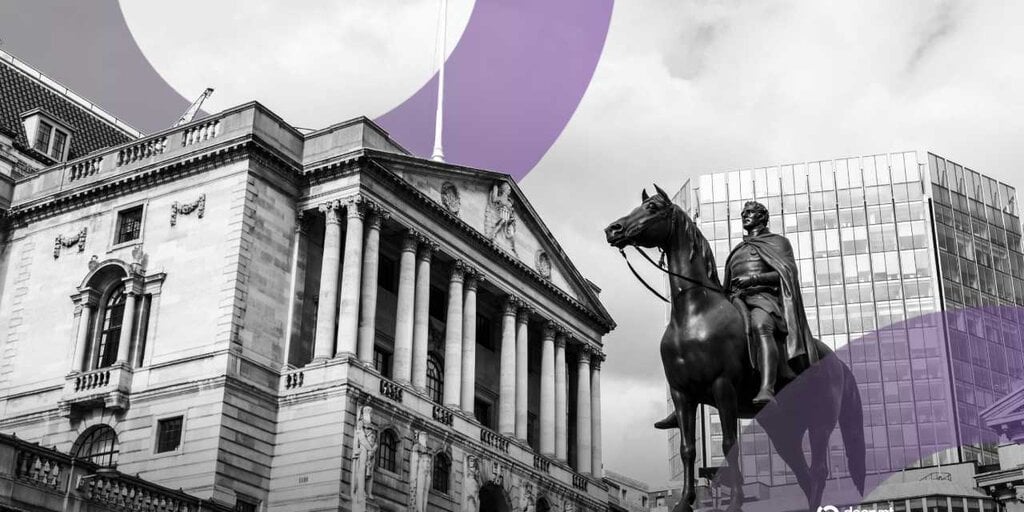In brief
The Bank of England proposal would cap stablecoin holdings at £10,000-£20,000 for individuals and £10 million for businesses.
A Coinbase executive said the caps would be “bad for UK savers, bad for the City and bad for sterling.”
Banking officials in the U.S. have also raised concerns about the market impact of stablecoins.
Cryptocurrency groups are urging the Bank of England (BoE) to abandon plans to cap the amount of stablecoins that individuals and businesses can hold in the UK.
“Imposing caps on stablecoins is bad for UK savers, bad for the City and bad for sterling,” Tom Duff Gordon, vice-president of international policy at Coinbase, told the Financial Times. “No other major jurisdiction has deemed it necessary to impose caps.”
The pushback comes following an FT report that BoE officials plan to continue pursuing the implementation of a 2023 BoE consultation paper on stablecoins.
The paper suggested limiting individual holdings of systemic stablecoins—those widely used for payments in the UK or likely to be—to between £10,000 and £20,000 ($13,600–$27,200). Businesses would face a ceiling of around £10 million ($13.6 million). Central bankers argue the restrictions are needed to prevent large outflows from traditional bank deposits, which could threaten credit supply and financial stability.
The debate comes as interest in stablecoins is rapidly expanding around the world. Global market capitalization has reached $293 billion, according to CoinGecko. Analysts project the sector could eventually scale into the trillions. That said, similar projections were also made for other crypto endeavours that passed through periods of hype and popularity but ultimately flopped such as NFTs and the metaverse.
The UK’s approach contrasts with recent developments abroad. The U.S. Congress passed the GENIUS Act this July, creating a licensing and reserve framework for stablecoin issuers without placing limits on holdings.
“This news reinforces how cautious the UK remains compared to the US and some other countries,” Will Beeson, Founder and CEO of Uniform Labs told Decrypt. “But the genie is out of the bottle—stablecoins are already being used by millions globally, with hundreds of billions in circulation.”
He added that for many, they are a better payments product and, in some markets, a better savings product. “Demand is here, and trying to cap usage risks pushing users toward self-custody or offshore options. Rather than impose artificial limits, a better approach would be to embrace innovation within the UK’s financial system and build competitiveness around sterling in a digitally native financial world,” he said.
Stablecoins and stability
Still, even in jurisdictions without caps, the stability risks posed by stablecoins remain hotly debated. In August, U.S. banking groups warned Congress that the GENIUS Act contained loopholes that could allow yield-bearing stablecoins to siphon trillions from deposits, threatening credit markets. A Treasury report from April estimated potential outflows could reach $6.6 trillion if stablecoins were allowed to offer interest.
Nevertheless, crypto industry voices caution that caps would undercut the UK’s competitiveness at a pivotal moment. “What we are seeing is reflexive regulation in response to the rapid growth of stablecoins and synthetic dollars,” Behrin Naidoo, founder of Neutrl Labs, told Decrypt. “If these limits are imposed, they would dampen stablecoin development and stall financial innovation in the UK. Rather than addressing systemic risk, restrictive measures at this stage would push capital to other financial centers.”
He added that banks have historically overstated risks when new financial instruments challenged their business models. “Institutions like BBVA have already found ways to incorporate stablecoins such as USDC into their trading services,” Naidoo said. “Ultimately, rather than undermining banks, these instruments will be integrated into their business models.”
Daily Debrief Newsletter
Start every day with the top news stories right now, plus original features, a podcast, videos and more.




